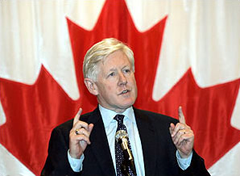
Several years ago, at a Clubs Day event on campus, members of the Simon Fraser University Liberal squad staffed an information table bedecked with a poster reading "Clowns on the left of me, jokers to my right..." The hipness of the rock lyrics (a sense of cool rendered eternal by Reservoir Dogs) contrasted strongly against the yogurt-coloured nerds of the sort one might expect from an association of quasi-ambitious political twenty-somethings.
But in that single scene were summed up nearly all the important themes evidenced in the writings of Bob Rae: the dullness, the affluence, and the nearly paranoid fixation with clowns on the left, jokers to the right. But at no point in either of his two books -- From Protest to Power: Personal Reflections on a Life in Politics (1996) and The Three Questions: Prosperity in the Public Good (2006) -- does Rae give the impression of someone who feels stuck in the middle with anyone: he's lonely at the centre, but he's happy to be there.
Readers expecting to find an explanation of the man's rightward drift from the NDP to the Liberals will, rather than finding a satisfactory answer, face another question entirely once the books are read: why wasn't he with them from the beginning? So few socialists have such a high regard for Edmund Burke as Rae does.
Trudeau to his right
The more autobiographical From Protest to Power -- which despite being a memoir is no less overtly political than the essay and centrist manifesto, The Three Questions -- offers one of the author's precious few explanations for his joining the NDP:
My problem with the Liberals was, and is, their smugness. People often express surprise at my choice of political family, but it followed a logical progression. I drifted from the Liberals as I realized how conservative Pierre Trudeau really was. I canvassed and worked hard for the Labour Party in England, and spent hours studying the history, theory and politics of social democracy. My advocacy work in North London and in Toronto on behalf of tenants and injured workers convinced me that the existing power structures had to be opened up, and that practical politics committed to doing just that could make a difference. (FPTP, page 63)
This sobriety about the actual legacy of Pierre Eliott Trudeau -- he of the left liberal revisionist fantasy -- is one of the most commendable recurring elements in Rae's writing, along with a well thought out and articulate defence of federalism that is both practical and principled, and which arises alongside a compelling advocacy of aboriginal self-government and an end to anti-native racism.
In the conclusion to The Three Questions, Rae warns that we are in danger of creating Detroit-style aboriginal ghettos through our continuing neglect. And in the identical introductions to both books, he draws upon his experiences in Iraq and Sri Lanka in order to put forward a case for federalism, which is more thoughtful and philosophical by far than the knee-jerk flag-waving that generally passes for meaningful constitutional debate.
'Never far enough'
But such passages are in short supply, and what makes up the bulk of Rae's writing boils down to condescending admonishments (sometimes thinly veiled as mea culpae for his disastrous regime in Ontario), hallucinatory delusion, and middle-of-the-road, Barack Obama-style platitudes without the charisma.
"It is … discouraging when people point fingers at everyone but themselves for their fate." By the time one gets to these words, on page 11 of Rae's second book, one has to laugh, then cry. Nearly every admission of error in his memoirs is accompanied by an accusation that someone else's political rigidity, on either the left or the right, had tied his hands. The following excerpts are from his chapter on the Social Contract (the NDP government's bundle -- or, some would say, bungle -- of social policy), in From Protest to Power:
"We never went far enough to satisfy child-care advocates, arts organizations, columnists, and others who demand the full moon or nothing at all. Now they have their starless sky [the Mike Harris government]." (page 234)
"My thanks from the auto industry for this [anti-scab] legislation and for saving the de Havilland that same autumn of 1992 was a gratuitous speech by Buzz Hargrove dumping on our government at the CAW council meeting in December." (page 236)
"Nothing I could do, no argument I could make made a difference. People I had assumed would understand something of our difficulties and fully expected to show some leadership and discipline themselves had decided to placate their own unhappy memberships by joining in the general dumping on me and the government." (page 238)
"I had reached the conclusion, if unarticulated even to myself, that it was better to do the right thing than placate some powerful interests." (page 238)
This last one is a variation on the theme, but it's a device that regularly recurs in Rae's recounting of his government's story in Ontario -- he disguises the political expediency and capitulation which prompted his many concessions to the centre and right as standing up to the special interest goliath of labour and the left, as though they were on the same footing as the province's corporate elite.
Tony Blair meets Martin Luther King
There was nothing new, of course, about Rae's tack: an easy and cost-free way of gaining points for any left-leaning provincial regime from Levesque's PQ to Dosanjh's B.C. NDP has been to crack down on public sector unions to give the illusion of independence, often as a means of politically subsidizing legislation benefiting workers in the private sector. The only difference with Rae was that he managed to alienate those who got their paycheques from the government as well as those who got them from GM.
Among the deepest of Rae's delusion are these two:
"[Social democracy] is the spirit that fuelled Western farmers in the Depression and industrial workers who sought shorter hours and higher pay. From Tommy Douglas to Martin Luther King to Tony Blair, the fire is about everyone having a chance." (TTQ, page 8)
This isn't altogether true; with Blair, "the fire" is about burning the skin off of Iraqis. The suggestion of a heritage linking King, one of the giants of the 20th century, to the moral dwarf cum war criminal currently lording over Great Britain and its odiously racist security laws is too obscene, and asserted in too bad of faith, to be taken seriously.
The second hallucination surrounds one of the Rae government's most patently idiotic ideas, "Rae Days" -- an annual, 10-day unpaid lay-off for workers.
"'Rae Days were a way of distributing work differently than firing younger employees. I say to my union friends: change the name if you like, but keep the idea alive." (FPTP, page 330)
Rae's magnanimity about copyright -- "change the name if you like" -- is perhaps the only thing in the world more laughable than the idea that any union leadership in its right mind would bring before its membership a proposal that they accept such a scheme.
'Who is for me?'
In The Three Questions, Rae -- a former student of Isaiah Berlin -- takes more of an opportunity to dig into his philosophy of government; an eclectic admixture of Burke, Blair, and another chap stuck in Babylon, Rabbi Hillel. (The titular troika of questions is Hillel's; "If I am not for myself, then who is for me? But if I am only for myself, what am I? And if not now, when?") But if it sounds novel summarized thusly, it isn't:
"The central lessons in the political economy of the 20th century are twofold: first, the surest way to economic growth is through an essentially privately owned, entrepreneurially driven, market economy; second, the achievement of this economy and its broad acceptability require sound public policy, strong and capable governments, good governance, and a respect for the key institutions and principles of civil society." (page 20)
Nothing so far that we wouldn't expect from a Liberal party politico. Add this to the party line on the War on Terror, from the introduction to both books; a repetition of the mantra that Iraq was wrong and Afghanistan was right, along with the requisite ambivalence about current combat operations in Central Asia in order to have something with which to criticize the Tories:
Mr. Chretien was right to oppose the invasion of Iraq. In my own work there I have been struck by how the destructiveness of the invasion has profoundly affected Iraqi opinion...
Canada was right to go into Afghanistan – as part of a United Nation [sic.] and NATO-sponsored mission. The collective, and morally-just goal was to put an end to an oppressive regime which -- the facts showed -- was directly sponsoring international terrorism.
I am troubled by talk of "Canada's anti-guerrilla war in Afghanistan…"
Earlier The Tyee profiled the writings of Stephane Dion and Michael Ignatieff; of the three, Rae is certainly the least writerly, with no real credits prior to his time in office. As a result, we get some pretty awful prose.
Speaking of the angry public in Ontario, he writes that his government "poured well-intentioned gasoline on their growing resentment" (FPTP, page 324).
When capturing the electricity of conversations in halls of power, he musters: "'Keynes just won't work,' Wilson said, to which I answered, 'I think a high deficit number will help make my case for balance over the long term'" (FPTP, page 229).
My personal favourite is when he expresses his faith in an aboriginal rights crusader in the native affairs portfolio, Bud Wildman, as someone who "would keep his ear to the ground," inevitably (though, I'm sure, unintentionally) recalling images of Tonto.
But even if the books don't make it clear that Rae deserves to be in the library, they certainly leave no question as to his right to claim the title of 'Liberal.'
Related Tyee stories:















Tyee Commenting Guidelines
Comments that violate guidelines risk being deleted, and violations may result in a temporary or permanent user ban. Maintain the spirit of good conversation to stay in the discussion.
*Please note The Tyee is not a forum for spreading misinformation about COVID-19, denying its existence or minimizing its risk to public health.
Do:
Do not: